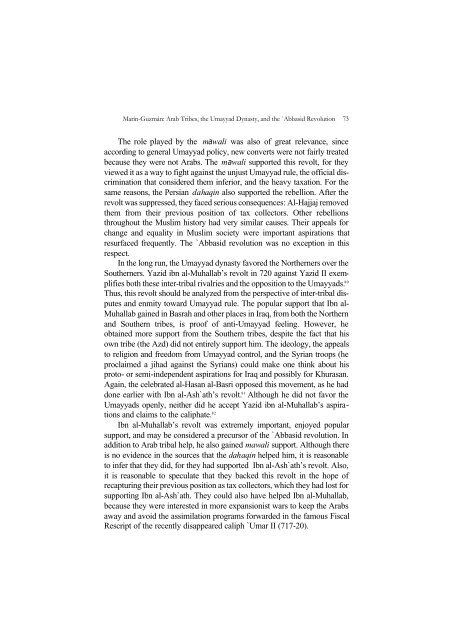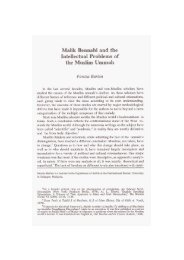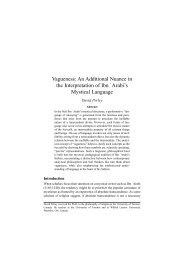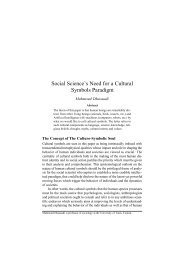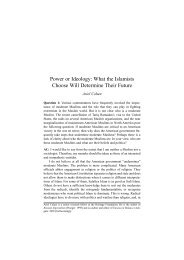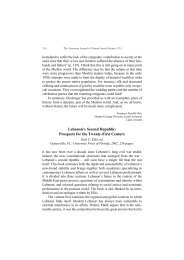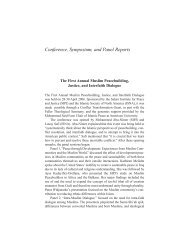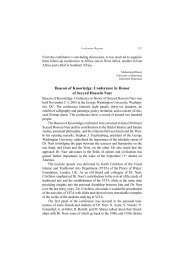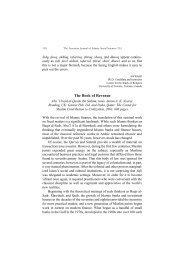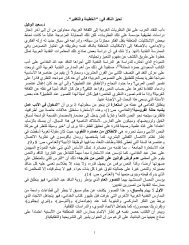Arab Tribes, the Umayyad Dynasty, and the `Abbasid ... - Epistemology
Arab Tribes, the Umayyad Dynasty, and the `Abbasid ... - Epistemology
Arab Tribes, the Umayyad Dynasty, and the `Abbasid ... - Epistemology
You also want an ePaper? Increase the reach of your titles
YUMPU automatically turns print PDFs into web optimized ePapers that Google loves.
Marín-Guzmán: <strong>Arab</strong> <strong>Tribes</strong>, <strong>the</strong> <strong>Umayyad</strong> <strong>Dynasty</strong>, <strong>and</strong> <strong>the</strong> <strong>`Abbasid</strong> Revolution 73<br />
The role played by <strong>the</strong> mawali was also of great relevance, since<br />
according to general <strong>Umayyad</strong> policy, new converts were not fairly treated<br />
because <strong>the</strong>y were not <strong>Arab</strong>s. The mawali supported this revolt, for <strong>the</strong>y<br />
viewed it as a way to fight against <strong>the</strong> unjust <strong>Umayyad</strong> rule, <strong>the</strong> official discrimination<br />
that considered <strong>the</strong>m inferior, <strong>and</strong> <strong>the</strong> heavy taxation. For <strong>the</strong><br />
same reasons, <strong>the</strong> Persian dahaqin also supported <strong>the</strong> rebellion. After <strong>the</strong><br />
revolt was suppressed, <strong>the</strong>y faced serious consequences: Al-Hajjaj removed<br />
<strong>the</strong>m from <strong>the</strong>ir previous position of tax collectors. O<strong>the</strong>r rebellions<br />
throughout <strong>the</strong> Muslim history had very similar causes. Their appeals for<br />
change <strong>and</strong> equality in Muslim society were important aspirations that<br />
resurfaced frequently. The <strong>`Abbasid</strong> revolution was no exception in this<br />
respect.<br />
In <strong>the</strong> long run, <strong>the</strong> <strong>Umayyad</strong> dynasty favored <strong>the</strong> Nor<strong>the</strong>rners over <strong>the</strong><br />
Sou<strong>the</strong>rners. Yazid ibn al-Muhallab’s revolt in 720 against Yazid II exemplifies<br />
both <strong>the</strong>se inter-tribal rivalries <strong>and</strong> <strong>the</strong> opposition to <strong>the</strong> <strong>Umayyad</strong>s. 80<br />
Thus, this revolt should be analyzed from <strong>the</strong> perspective of inter-tribal disputes<br />
<strong>and</strong> enmity toward <strong>Umayyad</strong> rule. The popular support that Ibn al-<br />
Muhallab gained in Basrah <strong>and</strong> o<strong>the</strong>r places in Iraq, from both <strong>the</strong> Nor<strong>the</strong>rn<br />
<strong>and</strong> Sou<strong>the</strong>rn tribes, is proof of anti-<strong>Umayyad</strong> feeling. However, he<br />
obtained more support from <strong>the</strong> Sou<strong>the</strong>rn tribes, despite <strong>the</strong> fact that his<br />
own tribe (<strong>the</strong> Azd) did not entirely support him. The ideology, <strong>the</strong> appeals<br />
to religion <strong>and</strong> freedom from <strong>Umayyad</strong> control, <strong>and</strong> <strong>the</strong> Syrian troops (he<br />
proclaimed a jihad against <strong>the</strong> Syrians) could make one think about his<br />
proto- or semi-independent aspirations for Iraq <strong>and</strong> possibly for Khurasan.<br />
Again, <strong>the</strong> celebrated al-Hasan al-Basri opposed this movement, as he had<br />
done earlier with Ibn al-Ash`ath’s revolt. 81 Although he did not favor <strong>the</strong><br />
<strong>Umayyad</strong>s openly, nei<strong>the</strong>r did he accept Yazid ibn al-Muhallab’s aspirations<br />
<strong>and</strong> claims to <strong>the</strong> caliphate. 82<br />
Ibn al-Muhallab’s revolt was extremely important, enjoyed popular<br />
support, <strong>and</strong> may be considered a precursor of <strong>the</strong> <strong>`Abbasid</strong> revolution. In<br />
addition to <strong>Arab</strong> tribal help, he also gained mawali support. Although <strong>the</strong>re<br />
is no evidence in <strong>the</strong> sources that <strong>the</strong> dahaqin helped him, it is reasonable<br />
to infer that <strong>the</strong>y did, for <strong>the</strong>y had supported Ibn al-Ash`ath’s revolt. Also,<br />
it is reasonable to speculate that <strong>the</strong>y backed this revolt in <strong>the</strong> hope of<br />
recapturing <strong>the</strong>ir previous position as tax collectors, which <strong>the</strong>y had lost for<br />
supporting Ibn al-Ash`ath. They could also have helped Ibn al-Muhallab,<br />
because <strong>the</strong>y were interested in more expansionist wars to keep <strong>the</strong> <strong>Arab</strong>s<br />
away <strong>and</strong> avoid <strong>the</strong> assimilation programs forwarded in <strong>the</strong> famous Fiscal<br />
Rescript of <strong>the</strong> recently disappeared caliph `Umar II (717-20).


